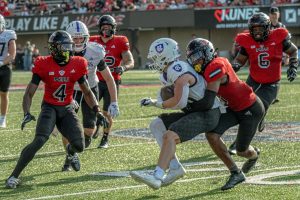Remembering the Holocaust
April 30, 2003
On Tuesday afternoon at the King Memorial Commons, during the annual remembrance day, students were reminded of the events and victims of the Holocaust.
“I am pleased with the turnout,” said Dara Rubinson, president of Hillel, the organization that sponsored the event. “I wanted it set up so students could just walk by and watch.”
Students walking through the MLK Commons were able to see the various pictures displayed at the event. The pictures showed people starved to the point of having skeleton-like bodies and young children surrendering to German forces.
The event drew in several people but, Aaron Ruder, a sophomore political science major, said he thought more people should have come.
“Jews were not the only ones killed in the Holocaust,” he said. “Homosexuals and handicapped people were also killed in the Holocaust.”
NIU President John Peters addressed the student body at the event. Peters said events like these were important for this generation because the Holocaust is becoming more and more distant. Peters also said that “madmen” would always be in the world.
“We have only to look to Iraq, the Balkans or Rwanda, or even New York and Oklahoma City,” he said.
There were other speakers who read short autobiographies about those who were killed or escaped during the Holocaust. Ken Quigley, an independent campus minister, was one of the speakers. Quigley said reading the selected biographies made him feel sad at about what happens in the world.
“I am surprised things like this could happen, and that it is still going on in the world,” he said.
Alacoque Kelly, another reader at the event, was consumed by emotion while reading the excerpts. She cried while reading the graphic accounts of what happened to Jewish prisoners. Kelly said she cried because she is a nanny for two Jewish children in Sycamore.
“I worry that anti-Semitism will rise again, and something might happen to the kids,” she said.
Kelly also revealed that she could not believe the types of inhumane things that mankind has done in history.
One of the speakers traveled from Los Angeles. Leslie Elod spoke about his father who died in the concentration camps.
“My father died in Mauthausen labor camp three days after the Americans arrived,0 he said.
Elod said the only reason he believed he survived was because his mother was a German Christian.






